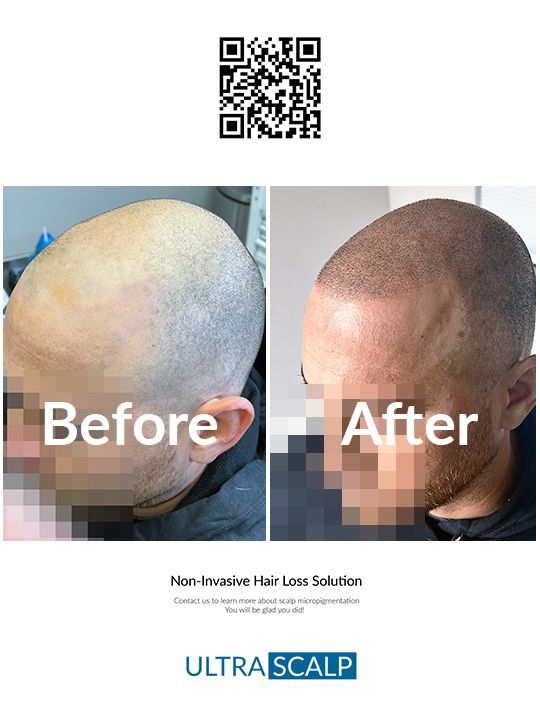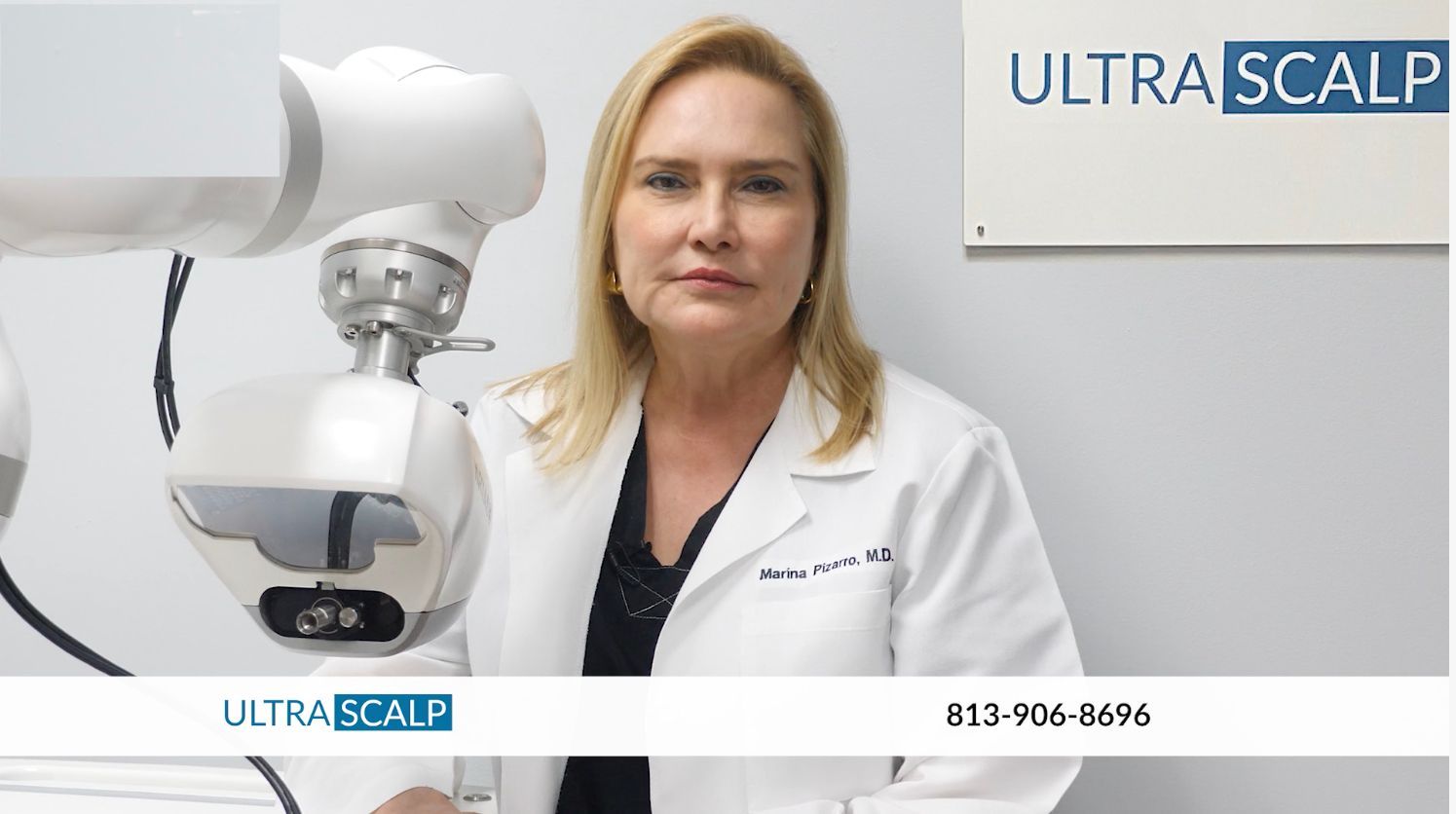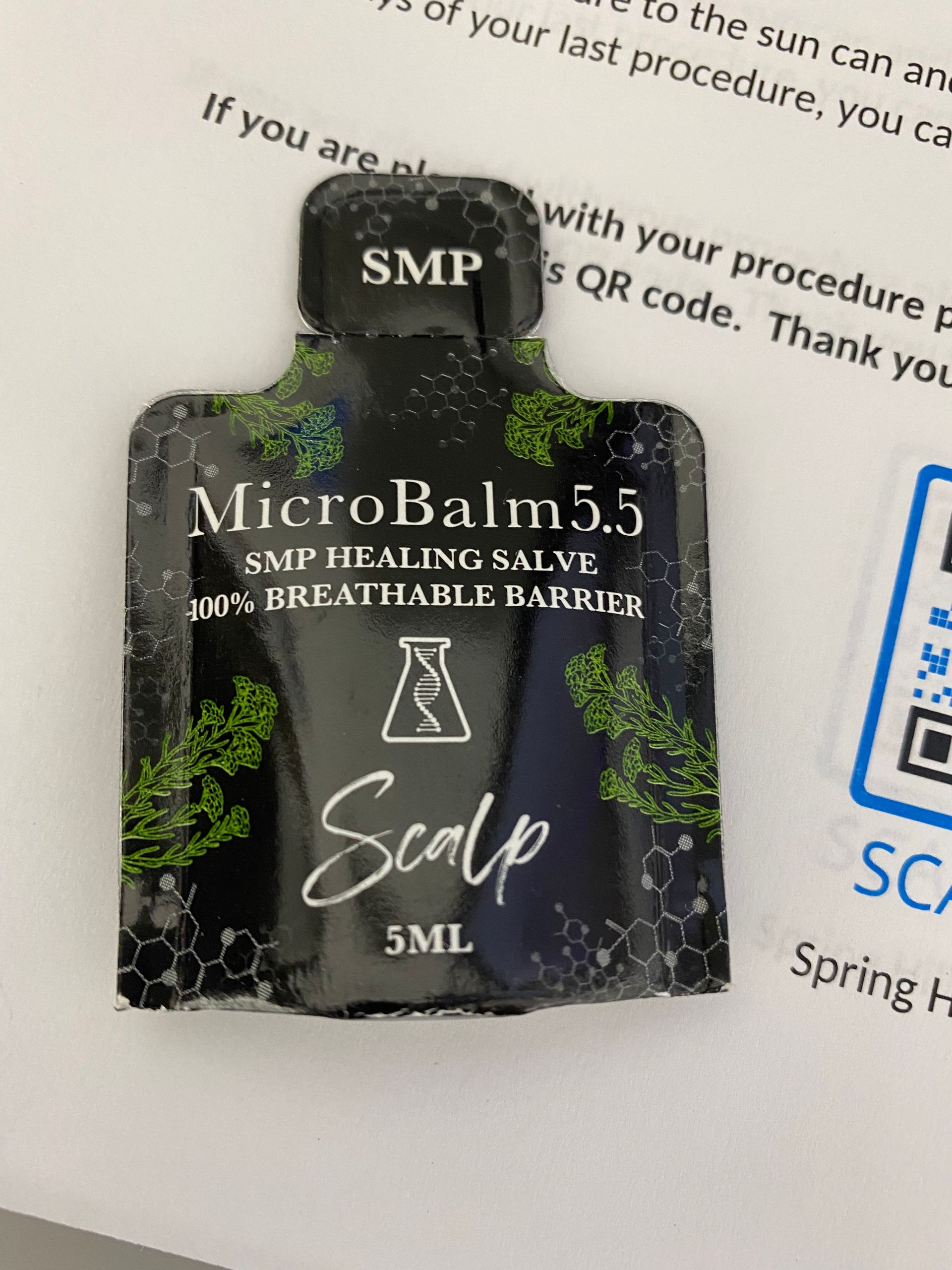The Science Behind Scalp Micropigmentation: How It Mimics Real Hair Follicles Tampa Fl Aug 2023

When it comes to addressing hair loss and thinning hair in Tampa, scalp micropigmentation (SMP) has emerged as a revolutionary solution for Tampa and all over the world. This cutting-edge technique not only restores the appearance of a full head of hair but also employs intricate scientific principles to mimic the natural look of hair follicles. In this article, we'll delve into the fascinating science behind scalp micropigmentation, exploring how it replicates the appearance of real hair follicles and provides lasting confidence to those dealing with hair loss.
Scalp micropigmentation is a non-invasive procedure that involves depositing tiny pigment dots onto the scalp's uppermost layers. These dots create the illusion of hair follicles, effectively simulating the appearance of a closely shaved head or a dense hairline. This technique is suitable for both men and women and can be customized to match various hair colors and skin tones.
The Science of Pigment Placement: Replicating Nature's Patterns
At the core of scalp micropigmentation's astonishing realism lies a blend of artistic finesse and scientific understanding. Central to this concept is the strategic placement of pigments, a process that not only demands skill but also an in-depth comprehension of the intricacies of natural hair growth.
Custom-Formulated Pigments
The journey towards mimicking real hair follicles begins with the selection of pigments. These pigments are not arbitrary; they are meticulously formulated to match the client's specific natural hair color. This customization is vital for achieving an authentic appearance. Just as every individual's hair color possesses its unique shade and undertones, the pigments used in SMP are mixed to replicate this variation accurately.
Replicating Distribution and Density
During the scalp micropigmentation procedure, the practitioner becomes an artist, wielding their tools with a surgeon's precision. The pigments are strategically placed to emulate the distribution and density of natural hair follicles. This process demands a profound understanding of hair growth patterns, angles, and even how hair tends to cluster in certain areas.
Natural Patterns and Angles
One of the factors that set scalp micropigmentation apart from other hair restoration methods is its commitment to adhering to nature's patterns. Hair doesn't grow in uniform directions; it follows a unique set of angles, swirls, and patterns on each person's scalp. The skilled SMP practitioner takes this into account and recreates these patterns, making the pigmented dots appear as authentic as possible.
Seamless Integration
The end goal of pigment placement is to create a seamless integration between the pigmented areas, existing hair, and the client's skin tone. This cohesion is achieved by the careful layering of pigments to simulate the appearance of hair follicles beneath the skin. The dots are placed at varying depths, imitating the way hair grows naturally from the scalp. This layering technique contributes to the three-dimensional illusion that makes SMP so convincing.
Visual Harmony
As pigments are applied, they work in tandem with the client's existing hair. This interaction creates a visual harmony that further enhances the realism. By meticulously matching the pigments to the client's hair color and strategically integrating them with the natural hair, the overall effect is remarkably lifelike.
The precision and science behind the placement of pigments in scalp micropigmentation exemplify the intricate nature of this innovative hair restoration technique. It's not just about replicating the appearance of hair follicles; it's about understanding the nuances of hair growth, angles, and patterns to craft a seamless illusion. SMP artists combine their artistic skill with scientific understanding to create results that stand as a testament to the harmony between human innovation and nature's beauty.
Optical Illusion and Depth Perception: Mastering the Stipple Effect
The remarkable realism achieved through scalp micropigmentation (SMP) goes beyond pigments and patterns—it delves into the realm of visual psychology, where an optical illusion known as the "stipple effect" plays a starring role. This phenomenon, harnessed by skilled SMP practitioners, creates a textured depth that transforms the perception of a closely shaven scalp into a remarkably convincing illusion of real hair follicles.
Unveiling the Stipple Effect
Imagine a canvas graced by countless delicate dots, each strategically placed to emulate the appearance of hair follicles. This mosaic-like arrangement is the cornerstone of the stipple effect. By adroitly varying the size, density, and shades of pigments, SMP practitioners orchestrate an intricate dance of light and shadow, eliciting the impression of textured hair.
Crafting Visual Depth
The stipple effect is a visual masterpiece rooted in science. Human eyes are adept at perceiving depth based on patterns of light and shadow. SMP harnesses this cognitive prowess, leveraging pigments to manipulate how light interacts with the scalp. Darker pigments create shadows, while lighter ones reflect light, mimicking the interplay of light and shadow seen on natural hair follicles.
The Illusion in Action
When one observes SMP from a typical conversational distance, the stipple effect comes to life. What appears, at close inspection, as a collection of meticulously placed dots transforms into an intricately textured scalp. This visual transformation convinces the brain that it's perceiving not just pigment, but actual hair follicles. The result is an astonishingly realistic illusion that challenges the boundaries of perception.
The Power of Normalcy
One of the most remarkable aspects of the stipple effect is its effectiveness in simulating normalcy. When viewed from the customary social distance—where most human interactions occur—the stipple effect flawlessly replicates the appearance of a hair-covered scalp. This practicality is what makes SMP not only an artistic feat but also a pragmatic solution for those seeking a natural-looking remedy for hair loss.
A Symphony of Science and Perception
Incorporating the stipple effect into scalp micropigmentation is akin to orchestrating a symphony of science and perception. Through the calculated arrangement of pigments, SMP practitioners manipulate the way light dances across the scalp, summoning an optical illusion that renders the presence of hair follicles seemingly tangible. This mastery of visual psychology contributes to the transformative power of SMP, offering individuals grappling with hair loss an avenue to regain both their appearance and their confidence.
Layering Technique for Realism: Crafting a Three-Dimensional Illusion
When it comes to recreating the illusion of a full head of hair through scalp micropigmentation (SMP), the artists' canvas isn't limited to the skin's surface. It's within the strategic layering of pigments, orchestrated with precision and finesse, that the technique's astonishing lifelike appearance takes shape. This layering technique, a cornerstone of SMP's success, adds depth, complexity, and a tangible 3D quality to the overall aesthetic, creating an illusion of hair that seems to emanate from beneath the skin's surface.
A Symphony of Depths: Creating Dimension
In the hands of a skilled SMP practitioner, pigments transform from mere color to a symphony of depths. The layering technique involves depositing pigments at varying depths within the skin. The pigments closest to the surface emulate the appearance of new, fine hair growth, while those deposited slightly deeper mimic the look of established follicles. This interplay between pigment depth and skin layering effectively conjures a three-dimensional illusion, akin to hair growing naturally from beneath the scalp.
Crafting Texture and Realism
Much like an artist employs layers of paint to build texture on a canvas, SMP artists layer pigments to mimic the texture of real hair. The amalgamation of these meticulously placed pigments generates subtle undulations and shadowing, akin to the texture found on a natural scalp. As light interacts with these layers, the result is a realistic play of highlights and shadows, enhancing the depth and authenticity of the SMP-treated area.
A Visual Illusion of Density
The layering technique goes beyond a mere optical trick; it transforms the perception of hair density. By varying the density of pigments in different areas, practitioners can simulate the appearance of denser hair growth where it naturally occurs, such as the hairline, and gradually transition to sparser areas with a more diffused application. This attention to density further contributes to the seamless integration of SMP with the client's existing hair.
Longevity and Fading: An Artful Aging Process
The longevity of SMP's realism is supported by the deliberate choice of pigments and the meticulous application process. The pigments used are formulated to endure the test of time while maintaining their original hue. Over the course of years, these pigments gradually fade, mimicking the subtle change in color that real hair undergoes as it ages. This natural fading process ensures that the results of SMP continue to appear authentic as they evolve over time.
The Harmony of Artistry and Science
Scalp micropigmentation transcends mere aesthetics; it's a testament to the seamless integration of artistry and scientific understanding. By layering pigments with precision and depth, SMP artists evoke the visual complexity of real hair growth, infusing newfound confidence into the lives of those who've grappled with hair loss. This innovative technique stands as a testament to the powerful synergy between scientific innovation and artistic craftsmanship, culminating in a solution that not only restores hairlines but also empowers individuals to rediscover their self-assured selves.
In the realm of scalp micropigmentation (SMP), an evolution has taken place that pushes the boundaries of realism and restores confidence to new heights. Enter Ultra Scalp Micropigmentation, an innovative approach that marries advanced techniques with a commitment to perfection. In Tampa, this groundbreaking solution is now accessible at your fingertips through Ultra Scalp's website, where you can learn more about this transformative procedure. Additionally, you can reach out for inquiries and appointments at 813-906-8696.
Unveiling Ultra Scalp Micropigmentation
Ultra Scalp Micropigmentation is more than a technique; it's a dedication to achieving unparalleled realism. Built upon the foundation of traditional SMP, this method introduces advanced layering techniques, specialized pigments, and an intensified attention to detail. The result? A level of realism that leaves clients in awe and onlookers believing in the power of a rejuvenated appearance.
http://www.ultrascalp.com
813-906-8696
https://goo.gl/maps/MtsL1AaHmoHNNXr66

Scalp Micropigmentation Clinics In Orlando & Tampa Areas
1701 N 14th St Suite B-4, Tampa, FL 33605
Phone: 813-906-8696
Google Map Ultra Scalp Micropigmentation Tampa
13555 Automobile Blvd Suite 110-B, Clearwater, FL 33762
Phone: 813-906-8696
Google Map Ultra Scalp Micropigmentation Clearwater
4971 Van Dyke Rd, Lutz, FL 33558 Phone: 813-906-8696
Google Map Ultra Scalp Micropigmentation Lutz
7575 Dr Phillips Blvd Suite 20-B, Orlando, FL 32819
Phone: 813-906-8696
Google Map
Ultra Scalp Micropigmentation Orlando




